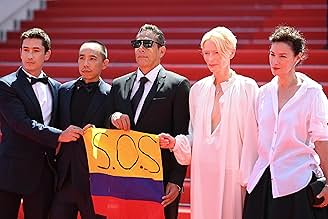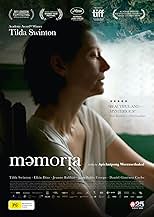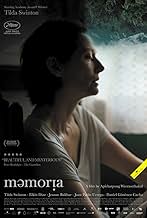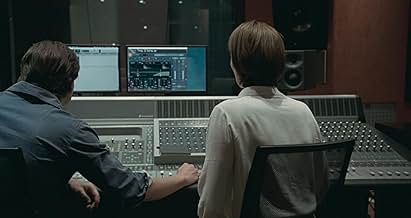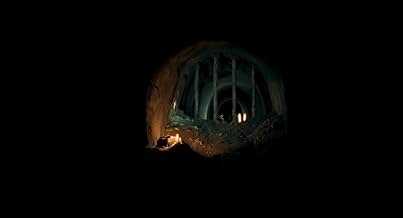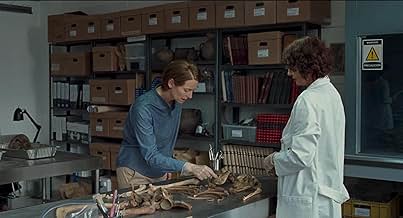IMDb-BEWERTUNG
6,4/10
12.327
IHRE BEWERTUNG
Eine Frau aus Schottland beginnt auf einer Reise in Kolumbien, seltsame Geräusche wahrzunehmen. Bald beginnt sie, über deren Aussehen nachzudenken.Eine Frau aus Schottland beginnt auf einer Reise in Kolumbien, seltsame Geräusche wahrzunehmen. Bald beginnt sie, über deren Aussehen nachzudenken.Eine Frau aus Schottland beginnt auf einer Reise in Kolumbien, seltsame Geräusche wahrzunehmen. Bald beginnt sie, über deren Aussehen nachzudenken.
- Regie
- Drehbuch
- Hauptbesetzung
- Auszeichnungen
- 9 Gewinne & 27 Nominierungen insgesamt
Daniel Toro
- Anthropologist Assistant
- (Nicht genannt)
Empfohlene Bewertungen
"Enjoy the silence" a title card states as Apichatpong Weerasethakul invites the viewer to experience MEMORIA; And, an experience it truly is as Weerasethakul's metaphysical film infuses the viewer with natural sights and sounds. That opening acts almost as an overture, as the Director's personal sketches are superimposed over still photographs from the production of the film - all 'scored' to absolute silence.
MEMORIA's protagonist is Jessica (Tilda Swinton) who awakes one morning to a mysterious sonic bang. Jessica is a botanist living in Columbia who is visiting her sister in Bogota. The bang continues to haunt Jessica as she goes about her daily life. Slowly, she feels that her mind is slipping - is she imaging the sounds? People she believes she has met don't seem to exist. On a drive back to her home in Medellin, she meets (or does she?) a man named Hernan (Elkin Diaz) and they spend a long afternoon together.
Weerasethakul's film doesn't have a formal plot. Swinton is so attuned to her filmmaker's methods that she inhabits rather than acts. The Director's method is to utilize only the most minimal of editing with extended takes. Cinematographer Sayombhu Mukdeeprom exquisitely captures the crucial mood and beauty of the natural world on 35mm film. The sonic bangs seem ever more loud because the sound design accentuates an organic soundscape; even the human voices are seemingly mixed below normal levels.
"Sometimes there's no escape except in dreams" reads another title card after the 'overture'. The classical definition of "Memoria" can be very loosely translated as "Memory", but its true meaning is much deeper. It describes a way in which the human mind stores and utilizes those thoughts and senses. The sonic bangs can be seen as a way of triggering Jessica's states of consciousness. Her own Memoria.
MEMORIA isn't a film for general audiences. Indeed, it's release is a never-ending world tour with the Producers claiming it shall never be sold for home viewing - streaming or physical media. It's very much a communal experience in a theater. The aural and visual tour de force to be savored not only by the individual -- but, by the audience in toto.
MEMORIA's protagonist is Jessica (Tilda Swinton) who awakes one morning to a mysterious sonic bang. Jessica is a botanist living in Columbia who is visiting her sister in Bogota. The bang continues to haunt Jessica as she goes about her daily life. Slowly, she feels that her mind is slipping - is she imaging the sounds? People she believes she has met don't seem to exist. On a drive back to her home in Medellin, she meets (or does she?) a man named Hernan (Elkin Diaz) and they spend a long afternoon together.
Weerasethakul's film doesn't have a formal plot. Swinton is so attuned to her filmmaker's methods that she inhabits rather than acts. The Director's method is to utilize only the most minimal of editing with extended takes. Cinematographer Sayombhu Mukdeeprom exquisitely captures the crucial mood and beauty of the natural world on 35mm film. The sonic bangs seem ever more loud because the sound design accentuates an organic soundscape; even the human voices are seemingly mixed below normal levels.
"Sometimes there's no escape except in dreams" reads another title card after the 'overture'. The classical definition of "Memoria" can be very loosely translated as "Memory", but its true meaning is much deeper. It describes a way in which the human mind stores and utilizes those thoughts and senses. The sonic bangs can be seen as a way of triggering Jessica's states of consciousness. Her own Memoria.
MEMORIA isn't a film for general audiences. Indeed, it's release is a never-ending world tour with the Producers claiming it shall never be sold for home viewing - streaming or physical media. It's very much a communal experience in a theater. The aural and visual tour de force to be savored not only by the individual -- but, by the audience in toto.
*Watched at Cannes 2021 World Premiere*
The work of Thai director Apichatpong Weerasethakul (try saying that five times fast) have never fully been able to register with audiences outside of the festival circuit. He has amassed universal critical acclaim since he graced the Cannes Riviera in 2004 with "Tropical Malady." He creates gaps between his feature films by creating several short films, some of which eventually are spawned into feature-length, such as the 2009 short "A Letter to Uncle Boonmee" becoming the 2010 Palme d'Or winning "Uncle Boonmee Who Can Recall His Past Lives." Now in 2021, Weerasethakul is stepping outside of his native Thailand for "Memoria," (translated from the Latin word "memory") which prompted another return to Cannes, this time netting him the Jury Prize.
The first English-language film for Weerasethakul, "Memoria'' is set within Colombia, following Tilda Swinton from destination to destination. The film opens with a surprising jumpscare illustrating our main character's problem, which is that she often hears a loud crashing noise that seems to be confined entirely within her head. This noise confounds her, leading to an investigation into what exactly it is and why it is happening, which puts her in contact with a sound engineering student, a morgue doctor, and a strange fisherman offering profound insights on memory and identity.
Those familiar with the work of Weerasethakul will know that the plot is not the driving force behind the ultimate narrative. Instead, the visuals and sound work do the bulk of the heavy lifting. Within "Memoria," dialogue is seldom found for long stretches at a time, leaving the viewer to look at the screen like one would look at a painting, soaking in as much information as possible. This restriction of information will irritate those looking for answers to the questions the film raises, which Weerasethakul doesn't have any intention of addressing. The Cannes World Premiere garnered nearly fifty walkouts from disgruntled viewers, and several nodding heads from the slow pacing that were often reawakened by the mysterious crashing noise, which shook the theatre.
Swinton acts less like a character and more like a wandering observer. Never shot in closeup and always present of the world around her, she moves from place to place, learning new information about her condition, all without much dialogue from her end. The first half of the film is where Swinton does most of her traveling, which keeps the film moving at a steady, yet still slow, pace. Much of the "action" within these journeys would be considered filler in most mainstream projects, such as Swinton waiting patiently for the sound engineer to finish his work before addressing her, or an unbroken take consisting solely of car alarms going off.
The last hour of the film is where some will applaud and others will boo (just as they did at the world premiere). Swinton's final journey takes her to a remote village housing a fisherman who claims to remember everything about his life. The two of them engage in an extended conversation that explores the strange connection they share. To an extent, the conversation acts as a vessel for Weerasethakul to talk to his audience about his ideas about cinema and life. It's a bold move by a director not known for boldness, and is one that teeters reshapes the way you look at the world at its best and teeters on self-aggrandizing at its worst. Weerasethakul ties his thesis up in a perfect bow with an ultimate answer that is fittingly incomprehensible and produces several more questions.
"Memoria" is a work for the cinephiles that need an escape from the noise of the modern world. It's wildly beautiful and imaginative, all while challenging your patience and viewpoints. Go in with an open mind, and you find yourself enlightened.
The work of Thai director Apichatpong Weerasethakul (try saying that five times fast) have never fully been able to register with audiences outside of the festival circuit. He has amassed universal critical acclaim since he graced the Cannes Riviera in 2004 with "Tropical Malady." He creates gaps between his feature films by creating several short films, some of which eventually are spawned into feature-length, such as the 2009 short "A Letter to Uncle Boonmee" becoming the 2010 Palme d'Or winning "Uncle Boonmee Who Can Recall His Past Lives." Now in 2021, Weerasethakul is stepping outside of his native Thailand for "Memoria," (translated from the Latin word "memory") which prompted another return to Cannes, this time netting him the Jury Prize.
The first English-language film for Weerasethakul, "Memoria'' is set within Colombia, following Tilda Swinton from destination to destination. The film opens with a surprising jumpscare illustrating our main character's problem, which is that she often hears a loud crashing noise that seems to be confined entirely within her head. This noise confounds her, leading to an investigation into what exactly it is and why it is happening, which puts her in contact with a sound engineering student, a morgue doctor, and a strange fisherman offering profound insights on memory and identity.
Those familiar with the work of Weerasethakul will know that the plot is not the driving force behind the ultimate narrative. Instead, the visuals and sound work do the bulk of the heavy lifting. Within "Memoria," dialogue is seldom found for long stretches at a time, leaving the viewer to look at the screen like one would look at a painting, soaking in as much information as possible. This restriction of information will irritate those looking for answers to the questions the film raises, which Weerasethakul doesn't have any intention of addressing. The Cannes World Premiere garnered nearly fifty walkouts from disgruntled viewers, and several nodding heads from the slow pacing that were often reawakened by the mysterious crashing noise, which shook the theatre.
Swinton acts less like a character and more like a wandering observer. Never shot in closeup and always present of the world around her, she moves from place to place, learning new information about her condition, all without much dialogue from her end. The first half of the film is where Swinton does most of her traveling, which keeps the film moving at a steady, yet still slow, pace. Much of the "action" within these journeys would be considered filler in most mainstream projects, such as Swinton waiting patiently for the sound engineer to finish his work before addressing her, or an unbroken take consisting solely of car alarms going off.
The last hour of the film is where some will applaud and others will boo (just as they did at the world premiere). Swinton's final journey takes her to a remote village housing a fisherman who claims to remember everything about his life. The two of them engage in an extended conversation that explores the strange connection they share. To an extent, the conversation acts as a vessel for Weerasethakul to talk to his audience about his ideas about cinema and life. It's a bold move by a director not known for boldness, and is one that teeters reshapes the way you look at the world at its best and teeters on self-aggrandizing at its worst. Weerasethakul ties his thesis up in a perfect bow with an ultimate answer that is fittingly incomprehensible and produces several more questions.
"Memoria" is a work for the cinephiles that need an escape from the noise of the modern world. It's wildly beautiful and imaginative, all while challenging your patience and viewpoints. Go in with an open mind, and you find yourself enlightened.
So, this film is artistic AF. It has all of what most people who enjoy film dont like ( including myself) but it is an spiritual retreat. So i would suggest that you get a nice wine, sit comfortable in front of a big screen with good sound and enjoy a very slow visual artistic film. That in general. I also recommend to watch it alone, i think it is a very private film, and you will enjoy better when you can fully inmerse.
The director challenges the viewer the whole first part of the film, but preparing you for the next. Needs to bring you heart rate very low, and you will feel how time stops at some point. You will forget about outside world in the second part. Its not a film to entertaind, its more like a trip to the jungle , find a shaman, try ayahuasca and come back to normal life. Seems surreal, makes you wonder... Personally i was not prepared properly to watch this film, but i enjoyed it because i am also a photographer so i was enjoying every static frame. There is craft on this film, technically stunning.
The director challenges the viewer the whole first part of the film, but preparing you for the next. Needs to bring you heart rate very low, and you will feel how time stops at some point. You will forget about outside world in the second part. Its not a film to entertaind, its more like a trip to the jungle , find a shaman, try ayahuasca and come back to normal life. Seems surreal, makes you wonder... Personally i was not prepared properly to watch this film, but i enjoyed it because i am also a photographer so i was enjoying every static frame. There is craft on this film, technically stunning.
Maybe this movie was to overhyped for me, but it probably is the biggest disappointment of 2021 for me.
The concept was ambitious, but the movie still cant decide what it wants to be and in the last 10mins it completely shifts its genre, which was just to much...
Tilda Swinton is brilliant in it, no doubt, but this plot, that gets dragged out more and more (and I usually love slow paced movies, but that was even to much for me) simply doesnt help itself. It reminded me a bit of LOST at times, where it mysteriously opens up a loooot of questions but never answers any of those.... or you could say... "it leaves it up for interpretation". A second viewing would certainly help you to understand those connections better, but I cant make myself endure this another time.
Its such a shame that this amazing idea has not been executed much more smoothly.
The concept was ambitious, but the movie still cant decide what it wants to be and in the last 10mins it completely shifts its genre, which was just to much...
Tilda Swinton is brilliant in it, no doubt, but this plot, that gets dragged out more and more (and I usually love slow paced movies, but that was even to much for me) simply doesnt help itself. It reminded me a bit of LOST at times, where it mysteriously opens up a loooot of questions but never answers any of those.... or you could say... "it leaves it up for interpretation". A second viewing would certainly help you to understand those connections better, but I cant make myself endure this another time.
Its such a shame that this amazing idea has not been executed much more smoothly.
This movie is only for the eyes of a few people. To those eyes, it offers many answers, inspiration, and a lot of insight - to the latter it will look like total rubbish. I understand and respect this. However, this movie was fascinating for me. It requires a great amount of patience and total attention - and a base knowledge of buddhism helps a lot with many symbols scattered around the movie. It is something that needs you to focus with an open mind - because it has nothing to do with a story, a plot, it rather gives you the chance to observe a very subtle reality often ignored. Not with a storyline, but a chain of circumstances which may look meaningless or unimportant if you don't look close enough. Sounds were used brilliantly, and the whole movie made me feel there was nothing decorative, all scenes, and little things, and pauses were there only because they were absolutely necessary to deliver the message. It was more like a meditation. This one provided me so many unexpected answers and spiritual inspiration, and I'm sure I'll be thinking about it and 'feeling' it for a while.
Wusstest du schon
- WissenswertesIn an unconventional move, art-house film distributor Neon is releasing Memoria in the USA "from city to city, theater to theater, week by week, playing in front of only one solitary audience at any given time." And furthermore, according to IndieWire (10/5/21) the film will only play in theaters and it will not become available on DVD, on demand, or on streaming platforms. They later abandoned this release strategy though after touring through only New York and Chicago and the film was eventually released in many cities simultaneously across North America in April, 2022.
- Zitate
Older Hernán Bedoya: I remember everything, so I limit what I see.
- VerbindungenReferenced in Radio Dolin: Stream with Anton Dolin (2021)
- SoundtracksMemoria
Written by César López
Piano performed by César López
Cello performed by Sandra Parra
Recorded by Julio Monroy
Recorded in Bogotá, Columbia by Burning
(C) 2020 Burning
Top-Auswahl
Melde dich zum Bewerten an und greife auf die Watchlist für personalisierte Empfehlungen zu.
- How long is Memoria?Powered by Alexa
Details
Box Office
- Bruttoertrag in den USA und Kanada
- 52.656 $
- Eröffnungswochenende in den USA und in Kanada
- 6.797 $
- 26. Dez. 2021
- Weltweiter Bruttoertrag
- 588.713 $
- Laufzeit2 Stunden 16 Minuten
- Farbe
- Sound-Mix
- Seitenverhältnis
- 1.85 : 1
Zu dieser Seite beitragen
Bearbeitung vorschlagen oder fehlenden Inhalt hinzufügen



